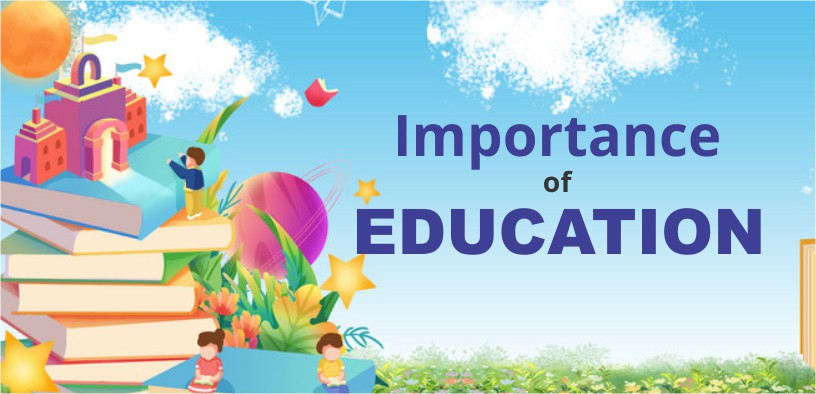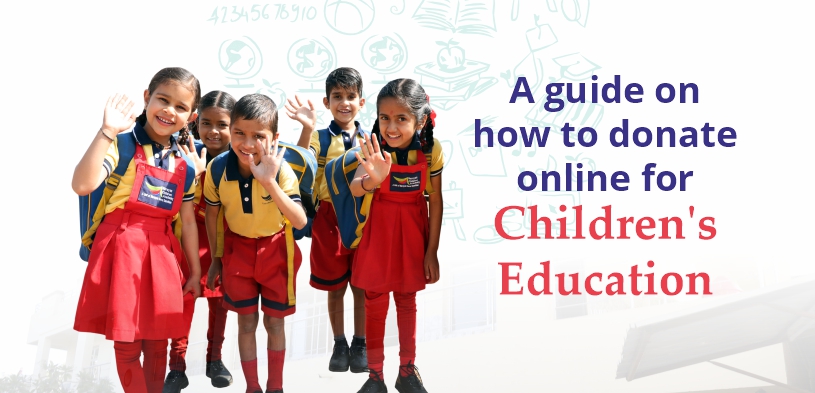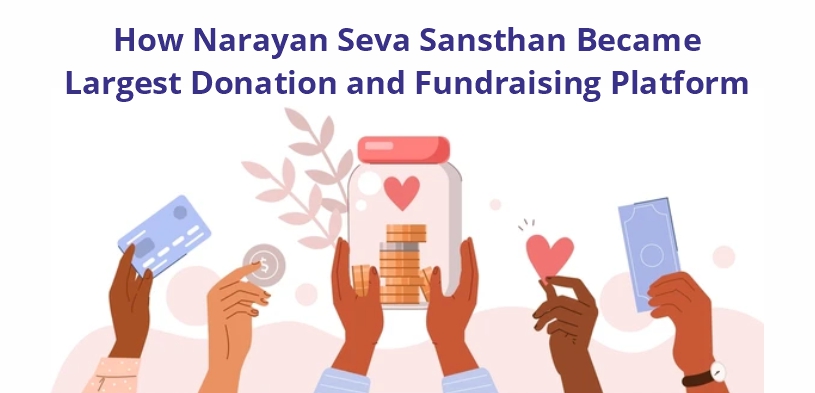Education plays a fundamental role in developing an equitable nation. It encourages people to increase their productivity and achieve their full potential. Taking Sustainable development goal 4 which seeks to ‘ensure inclusive and equitable quality education to promote lifelong learning opportunities for all’ by 2030, the government of India has taken some commendable steps like National education policy 2020. Since the past few years, the Indian government has been constantly trying to create awareness regarding the Importance Of Education to the public.
With acts like Right to education and schemes like Sarva Shiksha Abhiyan, National Merit-cum-Means Scholarship scheme, mid day meal scheme, and so on, the government has been successful in reaching millions of people, especially the underprivileged sections of the society, and motivated them to send their children to schools.
Apart from the government, several individuals, and non- governmental organisations have been consistently trying to reach out to underprivileged sections and encourage their children to attain education.
However, the question that arises here is why are there so many efforts put forth by governmental and non-governmental organisations to promote education. Why is education important? What is the current situation of the education sector in India? How can we help in educating the country? Let’s look at them –
What is the importance of education?
Before learning about the situation of education in the country, let’s have a brief understanding about what education is and why it is so important. Education could be defined as a theoretical and practical combination of studying to obtain knowledge regarding various subjects that can be later applied to their daily lives.
Benefits of education
Here are few reasons why education is necessary and beneficial for the people and the country-
- Better career opportunities
Education often opens the door to new and better career opportunities. Even with the most basic education, which is, the knowledge of reading and writing, the person can take up a much better job opportunity than what he/she would otherwise opt for. Hence, the importance of education for poor child, especially, becomes a great deal here as they can be encouraged to go for a better job position due to their education and ability to write and read.
- Financial security
With education, the student can apply for higher paying jobs which can assure their financial security. This is another reason for education being very significant to children from underprivileged sections. Education can empower and encourage them to get a higher paying job which can provide financial security to them and their family.
- Equality
It is believed that equality in a country can be promoted if the starting line is made the same for all. Education for all in this case can be that starting line. With quality and same education opportunities for all, the children from underprivileged sections may also stand a chance to empower themselves. This, as a result, can play a big role in reducing the social gaps existing in the country.
- Self- dependency
With education, one gets the power of knowledge which they can apply in their daily lives and become self dependent. They can also empower others around them by sharing their knowledge.
- Innovation and economic growth
” Education is the passport to the future, for tomorrow belongs to those who prepare for it today. ” This quote by the human rights activist and American Muslim minister, Malcolm X clearly showcases the significance of education in building a better future. Education paves way for new ideas and innovation which can help people in solving problems and make their lives easier. Other than that, education can also have a positive impact on the national growth and economy as with a more educated population, more opportunities and employment can be created and provided.

Right To Education (RTE) Act
On 4th August ,2009, the parliament of India enacted the Right to education (RTE) act which came into effect on 1st April 2010. The act focused on enhancing the education quality and rectifying the problems in the education system.
The act included points like-
- Providing free and compulsory education to all children from six to fourteen years. It also clearly stated that ‘free’ means no student has to pay any form of fees or bear any expense that prevents them from attaining the basic elementary education,
- Provisions for children who are not admitted to be admitted to an age appropriate class,
- Norms and standards regarding the building and infrastructure of government schools, school working days, teacher working hours and pupil teacher ratio (PTRs),
- Specifies the responsibility and duties of parents, appropriate local or other government authority in providing free and compulsory education for all children,
- Appointment of trained teachers with requisite entry and necessary educational qualifications,
- Prohibition of physical punishment and mental harassment, acquiring of fee, running of schools without recognition, private tuitions provided by teachers, and screening procedures for admission of children, and so on.
Scenario of education in the country
Despite acts like Right to education and several governmental schemes, India still faces the problem of illiteracy. At present, the country’s literacy rate stands at 77.7% as reported by the National Survey of India. Even though this is a good percentage, it also indicates that nearly one in every four Indians is still unable to read and write.
Apart from provision of formal education, the low quality of education has also impacted the country negatively. According to the Annual Survey of Education Report (ASER), 2018, only half of the students of grade 5 with more than four years of learning experience are able to read a grade 2 text fluently.
Apart from that, the content and their relevance of the study materials are also often ignored. Students are encouraged to ‘mug up’ the concept rather than understanding it.
The situation of education of poor children especially girls is even more concerning. Despite the prohibition of child labour, around 49.84 lakh children are working as labourers according to National Sample Survey Organisation (NSSO).
As per the 2022 statistics report released by the Ministry of education, the dropout rate of young children has almost doubled in 2022. As per the figures given by the Unified District Information System for Education (UDISE), the dropout rate at primary level (class 1- 5) and upper primary level (class 6-8) has gone up to 1.5 percent and 3 per cent respectively in 2021-22.
It is often seen that the majority of these children dropping out belong to underprivileged sections of the society. The concerning fact in the dropout rates that has been observed in the past few years is the rate of female dropouts which is often more than the male ones. According to the Annual survey for education report, 2018, family constraint is one of the strongest reasons for high female dropouts.
With the gender inequality and traditional gender norms still persisting in the country, the girls are often restricted from studying and are made to do house chores and take care of younger siblings. Other than that, early marriages, and lack of safety and encouragement towards girl’s education also plays a huge role in them leaving studies.
Hence, the awareness regarding the importance of education for girl child is also something that the country has to focus on.
Education in rural areas
It is often noticeable that education in rural areas suffers more as compared to urban areas of the country. Majority of the rural population depend on government schools and non-governmental organisations for education as the rural families often lack sufficient income and resources to send their children to a private school.
However, despite the presence of a government school, parents do not send their children to schools due to following reasons-
- Financial crisis faced by rural families
The income from jobs in rural areas are often very low. This leads to families often struggling with money and resources to afford basic amenities of life. As a result, along with parents, even children are made to earn money at a young age so that the family can afford to lead a basic life.
With the burden of not having enough money, these children have to often priorities earning money over education.
- Unawareness
In many rural areas, people are still unaware about the importance of education and its benefits. They still consider learning as a waste of time and money and would encourage their children to start working rather than studying. This unawareness is a major barrier that hinders the child’s education, hence, the government should put in efforts to make these families understand the significance of education and how it could improve their lives.
- Poor education quality and lack of facilities
Poor quality of education and lack of proper educational facilities are two main problems that the majority of government schools in India face.
The emphasis on ‘mugging up’ the concept, little to no practical knowledge imparted to students, irrelevant facts, data or context being taught are some of the reasons behind the poor quality of education in these schools.
Apart from that, lack of trained teachers is another reason due to which quality education is not being encouraged in the country. At present, there is a lack of trained teachers in the country due to which the government is struggling with appointing good teachers in the government schools.
Apart from this, lack of educational facilities like buildings, sanitation facilities, libraries, can affect the education quality negatively.
In 2021, India’s rural literacy rate stood at 73.5%. Even though this percentage has been improving over the years, the government and schools have to make sure that they keep encouraging people to take up education through their various schemes, campaigns and programs.
Samagra Shiksha, Lok Jambish Pariyojana, Shiksha Karmi project and digital initiatives like e-Pathshala, Swayam Prabha, MOOC, and so on are some of the initiatives put forth by the government to promote and improve the quality of education in rural India.
How can you help in educating the country?
In India, every child has the right to attain basic education. Over the years, the government had put forth some commendable efforts in providing education to the underprivileged children of the country. However, apart from the government, there are several individuals, non governmental organisations and so on too that have been consistently reaching out to unprivileged sections and helping them with attaining education.
As an individual, there are a lot of ways through which you can contribute in educating the poor. Few of them are-
- Monetary donations
Money donation is one of the easiest methods through which one can help in educating the underprivileged. There are several governmental and non-governmental organisations that accept monetary donation help from the public.
These donations can be given in both online as well as offline mode. Nowadays, online modes of donations are gaining popularity as they are easy to use, hassle free, and allow quick transferring of money. Hence, one can easily donate from anywhere to an educational initiative or organisation of their choice.
- In kind donations
If not monetary, then in kind donations can be a great way of helping in education of the underprivileged children too. In kind donations refers to non-monetary or non-cash donations that can be given or donated by the public to any non-profit organisations of their choice.
Hence, donating items like books, stationeries, and so on to an educational NGO that accepts in kind donations can be a great way through which you can help the underprivileged children.
- Volunteer for teaching
There are several NGOs in the country that accept volunteers who can teach the underprivileged children. Hence, if you are someone who is interested in volunteering or teaching the underprivileged children or even adults, you can contact the education NGOs that accept volunteers and express your interest in working with them.
This volunteering work would not just help these underprivileged children and people but would let you see and understand their struggles. This work will also provide you with the satisfaction of helping and empowering the underprivileged people and children.
- Tutoring unprivileged children
If you are someone who was fortunate enough to attain the knowledge of reading and writing then why not share with others? Tutoring your nearby underprivileged children in your free time could be a great way in which you can help in educating the underprivileged children.
There are often many concepts that these children are unable to grasp in their classes or they would have doubts in solving some questions, hence, through tutoring, you can help them with understanding those concepts and clear their doubts.
- Organising or participating in awareness campaigns
Lack of awareness is one of the major reasons due to which several underprivileged children are not able to educate themselves properly. Many underprivileged parents often stay unaware of the governmental schemes and programs that could help their child in attaining basic education. At times, they are also unaware of the benefits that education can give them.
Hence, holding and participating in awareness campaigns can be a great way to encourage the underprivileged people to send their children to schools.
- Sponsor a talent
If you are someone who is wealthy enough to financially support an underprivileged child, then it could be one of the best ways through which you can actually change someone’s future for the better.
There are many underprivileged talents in our country who are unable to come forward due to lack of resources and support provided to them. If such children are sponsored they would not only lead a better life for themselves but may also make our country proud with their achievements.
- Spread awareness through social media
Nowadays, communicating with people has become very easy. There are several social media platforms that can connect you with people all around the world. Hence, using these platforms to encourage people to donate for a noble cause can be a great way through which one can contribute in helping the underprivileged.
By sharing posts regarding the need for education of the underprivileged in the form of case studies, data, facts, and so on, you can motivate other people to come forward and help in the noble cause.
- Collection drives
Holding or participating in the collection drives can be a great way to help the underprivileged children. You can help in collecting books, stationeries, bags, and other such educational items from your neighbourhood, school or college and donate it to your nearby education NGOs who accept in kind donations.
If not to the nearby NGOs, you can even personally donate these items to the underprivileged children nearby.
- Mentor an underprivileged child
One of the major problems that an underprivileged child often faces while educating themselves is the lack of guidance. They often do not have a proper guide or mentor who can tell them about different career paths or how to proceed in a particular subject or field of study.
Hence, if you are someone who can counsel a student, then helping an underprivileged child in their career matters can be a great way through which you can change their lives for the better.
Narayan Children Academy
If you are someone who is looking to donate to an NGO that can improve someone’s life through education, then Narayan Seva Sansthan could be an option for you to consider.
Narayan Seva Sansthan is one of the best NGOs in the country that has been consistently working towards improving the lives of the underprivileged sections of the society. Their Sevas have empowered millions of underprivileged people across the country.
To provide education to the underprivileged children, the Sansthan, in 2015, established an English medium co-educational school called Narayan Children Academy. The president of Narayan Seva Sansthan, Dr. Prashant Agarwal laid the foundation of Narayan Children Academy on 31st July, 2015, on the occasion of Guru Purnima at Leo ka Guda located in Badi, Udaipur.
The Academy provides quality education to underprivileged children for free of cost. Other than that, it also provides other educational facilities like uniforms, lunch, health care, conveyance and stationeries without charging them with any expense.
The sansthan aims to improve many underprivileged children’s lives through their academy and in order for them to do so they require monetary support and encouragement from individuals, businesses and institutions.
Other than Narayan Children Academy, they also have an orphanage called Bhagwan Mahaveer Nirashrit Balgrah which was established in 1990 to take care of orphan children. Along with other basic amenities, quality education and educational facilities are also provided to these children. Hence, you can also donate to their orphanages to provide these children with better education facilities.
Other than that, the sansthan also has an ‘Residential School’ for teaching children with visual and hearing impairment and an ‘MR Home’ for supporting mentally challenged children.
By donating to any of these causes, you can support the sansthan in providing quality education to more and more underprivileged children in the country.








